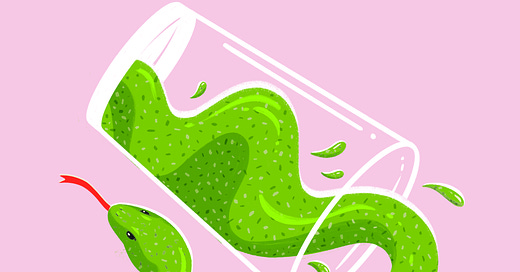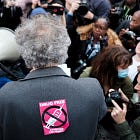How Can You Be Skeptical of Diet Culture Without Falling for Conspiracy Theories?
Some ways of telling the difference
I accidentally sent out two podcast episodes on Monday (sorry!), and I’ve been thinking about the interesting juxtaposition between them ever since.
In the main episode, molecular biologist Dan Wilson shares that he used to believe in conspiracy theories. One of the big ones for him was the claim that there’s a secret cancer cure (in the form of specific diet and lifestyle changes) that pharma companies have conspired to cover up. He explains how learning about the scientific method and starting to scientifically test his beliefs helped him realize they didn’t hold up, though it was a long and winding process to fully climb out of the conspiracist mindset. Today, he’s a professional scientist and a science communicator who debunks anti-vaccine conspiracy theories on his popular YouTube channel.
Meanwhile, in this week’s bonus episode, a reader asks whether pharmaceutical companies selling new weight-loss drugs may have a hand in making the concept of “food noise” go viral recently.1 I said I don’t know, but I’ve definitely gotten a real sponcon vibe from a lot of the “food noise” TikToks, and pharmaceutical companies have been known to partner with influencers on various kinds of campaigns. Basically, I wouldn’t put it past them.
I’ve been critical of these new diet drugs for years now. For one thing, many of the doctors and researchers profiled in the breathless media coverage of the drugs are actually being paid tens of thousands of dollars by the manufacturers, which journalists have often failed to report. Other writers and a few investigative journalists have covered how these conflicts are flying under the radar, shaping the public discourse and helping spur Ozempic and related drugs to astronomical levels of profitability.
At first glance, criticism of pharmaceutical companies’ efforts to influence public perception might seem like just another conspiracy theory targeting Big Pharma. The two are actually very different, but how can we tell? How do you distinguish between a conspiracy theory and a real issue (with the pharmaceutical industry or with anything else)?
I took a stab at answering this question in The Wellness Trap, as well as in a newsletter from a couple years ago about how anti-diet does not equal anti-vax. As I wrote there:
True conspiracies (and many other facts) are discovered through what researchers call “conventional thinking,” which is a good thing in their view: It means having “healthy skepticism of official accounts, while carefully considering available evidence and being committed to internal consistency.” This kind of thinking is what uncovered real conspiracies like the tobacco industry’s efforts to hide what it knew about the harmful health effects of smoking, or Volkswagen’s conspiracy to cheat U.S. emissions tests several years ago.
True conspiracies come to light thanks to two things: concrete evidence, like internal industry documents, whistleblowers sharing what they know in good faith, and peer-reviewed scientific studies; and authentic, logical inquiries, like investigative journalism, government investigations, and the scientific method.
In contrast, the hallmarks of conspiracy theories or “conspiracist thinking” are undue skepticism of any and all information that doesn’t fit the preferred theory, re-interpreting evidence that counters a theory to mean that whoever produced that evidence is “in on the conspiracy,” and inconsistent or contradictory beliefs. This is how you get the anti-vax industry claiming both that Bill Gates created the coronavirus that causes Covid-19 and that the virus doesn’t really exist—and anyone who challenges those beliefs (or even just points out their contradictory nature) is accused of being in the pocket of “Big Vaccine.”
Conspiracy theories aren’t responsive to evidence, which is why they tend to endure even when there’s no good data to support them.
Another helpful resource on this question is digital-literacy researchers Mike Caulfield and Sam Wineburg’s upcoming book, Verified, which I had the pleasure of reading early for a blurb. It distinguishes between different types of disagreements found in expert communities, which include (among others) majority/minority debates and fringe viewpoints.
The book goes into this in depth, but very briefly: in a majority/minority debate, “a nontrivial number of respected experts” may disagree with the majority viewpoint, and the minority’s arguments are given consideration in reputable journals, conferences, and the like. Fringe viewpoints, on the other hand, are dismissed by the vast majority of experts in a given field and aren’t even in conversation with the majority viewpoint. That’s not because of some conspiracy to keep them out, but simply because they don’t have enough good evidence behind them to warrant attention.
In my view, this distinction is key when it comes to critiques of diet culture. The disagreement among health professionals about weight and nutrition is an example of a majority/minority debate.
The majority of researchers and clinicians espouse the conventional diet-culture paradigm: that higher weight inherently causes poor health, that intentional weight loss is a path to well-being, that calorie reduction is an important goal, that certain foods are inherently bad for health, etc. But a minority disagree with this paradigm (hi, it’s me) and are represented at mainstream conferences, in peer-reviewed scientific journals, and in other respected outlets. There may be pushback or even fierce opposition to our views, but they’re in the conversation.
Of course this is not just an academic debate. Health professionals’ views on weight and nutrition have a real impact on people’s lives, for better or for worse. And things can get far muddier in non-academic discussions—especially on social media, which incentivizes incendiary and nuance-free takes, even occasionally from health professionals (hi, it’s me again).
I think that’s all the more reason why we need to be clear that reasonable skepticism of diet culture is not a conspiracy theory, and to do our best to talk about these issues in nuanced ways.
With all that being said, I’m curious: How do you personally navigate this minefield? Do you have other ways of telling the difference between conspiracy theories and issues worth serious consideration? Have you ever gotten pulled into conspiracist thinking? And if so, how did you get out?
As before, please just follow a few ground rules to help keep this a supportive space:





